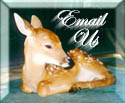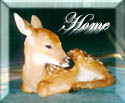  |
  |
| Home About Us Our Adoptees/Wards Care & Release Info What To Do Louisiana Contact Us Links |
Most of the orphans are babies found along roadsides staying by a killed mother, as in Raccoons and Opossums; and Squirrels, Owls, etc, that have fallen from nests. The injured are mostly birds of prey that have been shot. Raptors or Predatory birds (Hawks, Owls, Eagles, Ospreys, etc.) being large birds, and usually gliding on the wind - make easy targets. Automobiles also send many injured Raccoons and Deer to us.
Most of our wards are brought to us by government agencies, such as Animal Control, Wildlife & Fisheries, and State Park Rangers. Many, however, are brought to us by Individuals. Some, I'm sorry to say, are brought in by people who come across babies in the wooded areas, and thinking they are lost, pick them up. When in actuality, Mom is just a few yards away hiding in the bushes hoping that the humans will pass her babies by - so she can retrieve them. Regardless of how they first arrive; when first received, each animal is thoroughly checked over for injury, parasites, and, general health and condition. If an animal is injured, a Veterinarian is called in to assess the injury, and if needed, a broken leg or wing is set, or surgery is performed to remove a bullet.
And, sometimes, it is determined that the animal's injury or illness is so severe, that the kindest thing to do is to Euthanize it. We ask your understanding in this matter. One of the hardest things for a private citizen to understand, after they have rescued an injured or orphan and brought it to us, is that it is "put to sleep" or it dies. Nature dictates that "the strong survive and the weak die." It is no different when people try to assist an animal in need. It is a reality that many of the animals will not survive. Those that have a chance are patiently and lovingly cared for. Incubators, heating pads, and just plain old human body heat are used to quiet and warm a new arrival.
All are quarantined for a minimum of 24 hours. This gives the newcomer a chance to settle down and accustom itself to the surroundings, and to be better observed. After this period, if all is well, they are then placed with others of their kind, age, and similar condition. Baby mammals are fed a bottle formula of animal and/or human milk supplement, liquid vitamins, eggs, and bone meal. As they grow, dry pet chow, fruits and vegetables are added. Carnivores are supplemented with meat, canned dog & cat foods, eggs & fish. Raptors are fed a specialized diet of chicken parts, heavily injected with vitamins, iron and calcium, rolled in bone meal and fur or hair.
An animal that arrives fully mature is released as soon as it recovers. Most releases are done on a protected reserve or refuge to give the animal a chance to readjust to being on its own again.
A Center raised baby is another matter: predatory and foraging "techniques" are not an inborn instinct. They are normally taught by the mother; but, when "Mom" is human, well, the center-mom must take over and do the teaching. It is not the easiest thing to teach a hawk or owl to attack, kill, and eat a mouse; nor a raccoon to turn over a rock and catch a crawfish which can give a nasty pinch to a soft paw or nose. Patience, practice, and perseverance, help us not to be the ones chasing a mouse or getting a finger pinched.
When ready for release, Center raised orphans are taken to what we call a half-way area. These are protected wooded / swamp areas containing a large flight cage or enclosed exercise run where the animals, ready for release, are housed. They are fed and watered daily. At the end of approximately a week, the door is removed and, still being fed and watered daily, the animals are allowed to go and come as they please. Within a short time, they no longer return for food, and our job is finished until the next orphan arrives.


